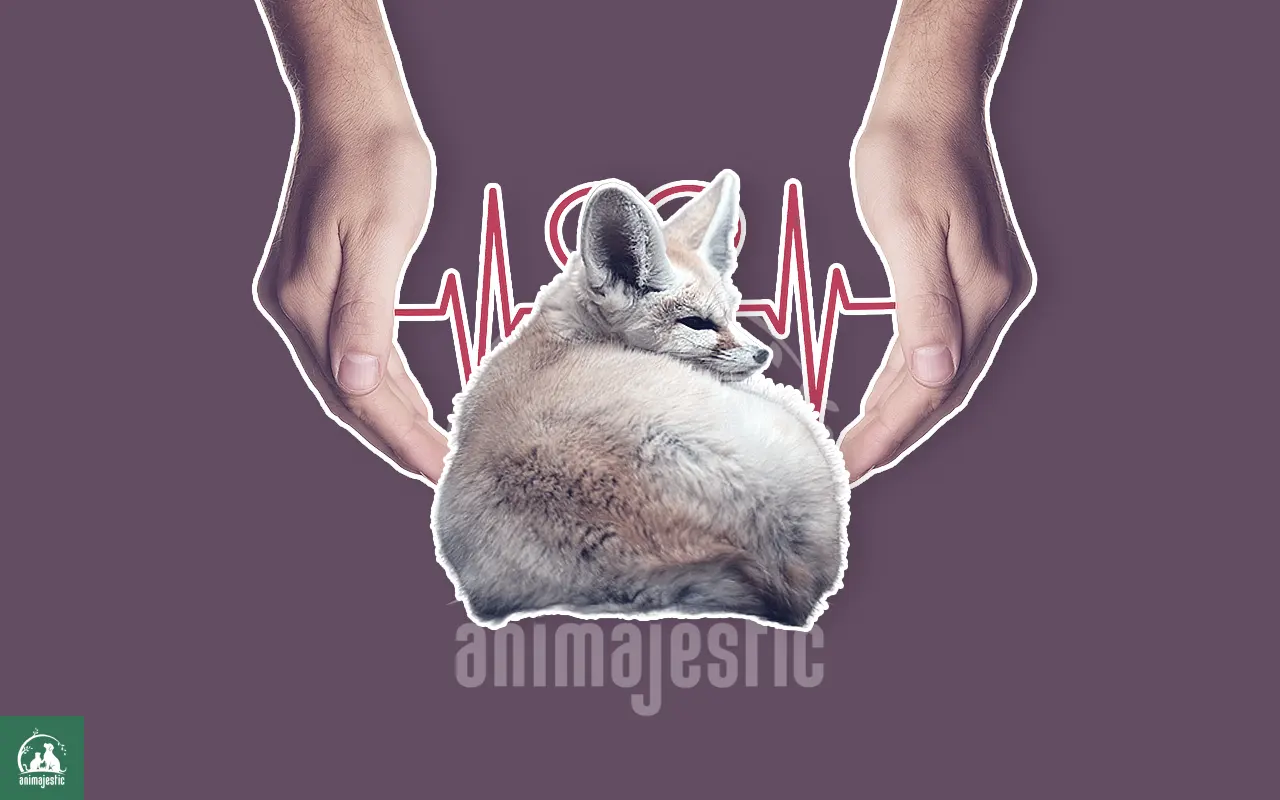Fennec foxes, admired for their adorable, distinctive characteristics are the smallest species of foxes in the world hail from the Saharan and Arabian deserts.
In recent years, they’ve become sought-after exotic pets for animal enthusiasts, maximizing their cuteness to full effect.
Understanding the common health issues in fennec foxes and catering to their unique needs is helpful in extending their 10-14 year lifespan and providing them with a comfortable, happy life.
Keeping Fennec Foxes as Pets
Fennec foxes, while captivating, present unique challenges as pets. When branching out into the world of exotic pets, it’s essential to grasp their needs and potential health complications fully.
Fennec foxes are not just adorable but are equally packed with solid energy, curiosity, and playfulness. Their well-being solely rides on our knowledgeable shoulders to ensure the best health outcomes.
Common Health Issues In Fennec Foxes
While Fennec foxes exhibit a striking resemblance to your typical household dog, their physiology is entirely different and bespoke to their natural habitat. Understanding these needs is not only vital but is a precursor to recognizing and spotting health issues in Fennec foxes.
1. Tricky Ear Mites
Owing to their large ears designed for heat dissipation in their desert habitat. Fennec foxes often fall prey to ear mites. These microscopic arachnids hide in the ear canal, causing noteworthy irritation, which usually manifests as frantic scratching, head shaking, and possible inflammation.
This continuous aggravation can sometimes lead to infection and potential hearing loss. Regular and careful cleaning not only helps manage an ongoing infection but also prevents mite infestations.
Additionally, diligent observation of your Fennec fox can alert you to tell-tale symptoms so you can take immediate action.
2. Gastrointestinal (GI) Parasites
GI parasites including whipworms, tapeworms, and roundworms, can easily establish themselves in Fennec foxes if not managed correctly.
Signs tend to be subtle at first, evolving into more drastic symptoms like;
- Chronic diarrhea
- Unexplained weight loss
- Decreased appetite
- Abdominal pain as the infection progresses
Routinely deworming treatments and a clean environment are key in preventing these parasitic invasions.
3. Common Dental Issues
Just like us, Fennec foxes also encounter dental problems when oral care is neglected. These cute little canines can suffer from tartar accumulation, gum disease, and tooth decay, leading to serious complications if ignored.
Including dental care, like brushing their teeth into their routine grooming can keep oral issues at bay and reduce the risk of future diseases.
4. Concerning Renal Disease
Renal or kidney disease is a silent health thief in Fennec foxes and can often go unnoticed until the later stages when intervention is more challenging.
Detecting earlier signs;
- Increased water intake
- Frequent urination
- Lethargic behavior
- Loss of appetite and Weight loss
These can help in early diagnosis and effective treatment. Regular veterinary check-ups contribute greatly to early detection.
5. The Obesity Epidemic
You might not assume it, but these compact creatures love to eat! If not controlled, Fennec foxes can easily become overeaters, favoring the comfortable household life a little too well.
Obesity leads the way to a multitude of health problems and significantly shortens their lifespan. Monitoring portion sizes, providing a balanced diet, and maintaining healthy exercise routines are paramount in combating obesity and associated health risks.
Fennec Fox Pack Leader: A Proactive Health Plan
Prevention is always better than cure, and the same applies to our little Fennec friends. As their only advocate, ensuring they are healthy and happy extends far beyond monthly vet checks.
Here are some actionable tips that keep their well-being at the forefront:
- Routine Vet Care: Preventative care is a game-changer. Regular vaccinations, health check-ups, and addressing minor health issues before they magnify are mandatory for every Fennec fox owner.
- Diet and Nutrition: Understanding their nutritional needs and providing a balanced diet is crucial. Monitor portions to prevent overeating and obesity and use high-quality commercial food mixed with fruits and vegetables to ensure they’re getting necessary nutrients.
- Hygiene and Grooming: Maintaining a regular grooming routine not only keeps your Fennec fox clean but also provides an opportunity to check for skin issues, parasites, or behavioral changes that could indicate health problems.
- Physical Stimulation and Exercise: As an active species, ensuring your Fennec fox gets plenty of exercise is vital. Playtime, games, and space to explore will go a long way in keeping them fit and preventing obesity.
- Observation: Lastly, keep an eye on changes in their behavior or appearance. Owners often detect signs of illnesses before they become severe due to their close bonds with their pets.
Your Fox, Your Family
Raising a Fennec fox is no small task. It requires dedication, knowledge, and a tremendous amount of love.
However, understanding their health needs and being proactive in their care will ensure that your fox not only lives a long, healthy life but that their life is as joy-filled as they make yours.
Looking after an exotic pet is a grand adventure, one that, with preparedness and education, can be incredibly rewarding.
